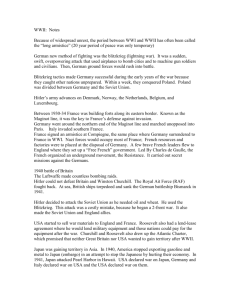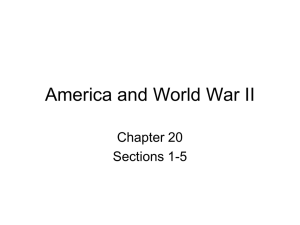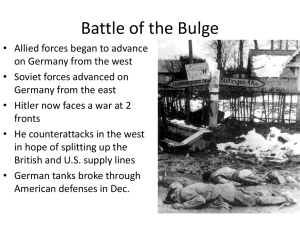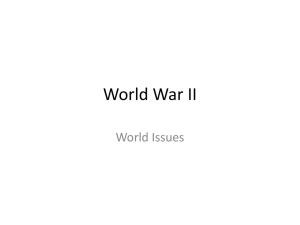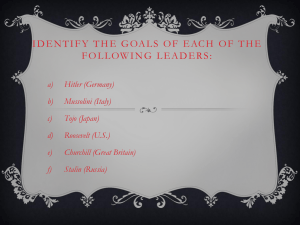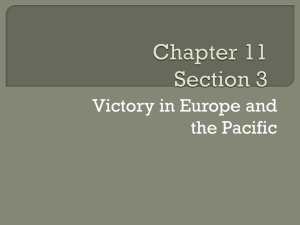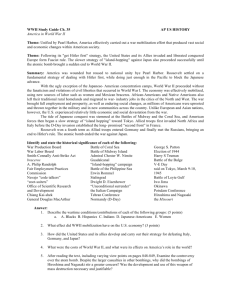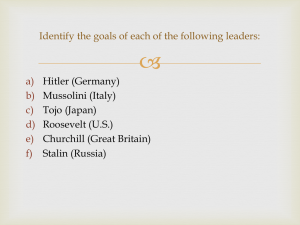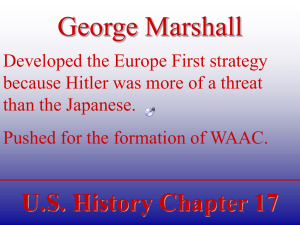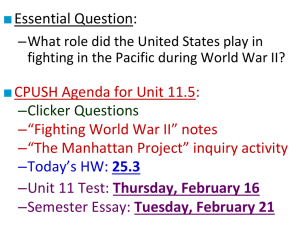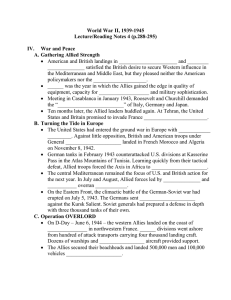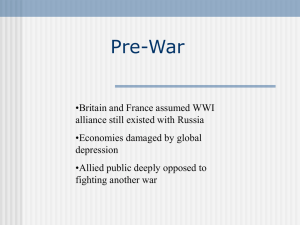WWII: Victory in Europe & Japan - Presentation
advertisement
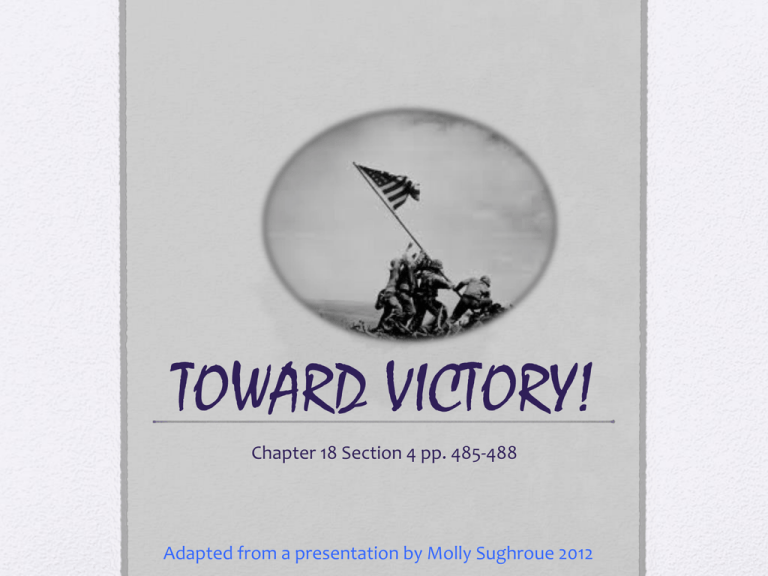
TOWARD VICTORY! Chapter 18 Section 4 pp. 485-488 Adapted from a presentation by Molly Sughroue 2012 Setting the Scene…. • Although the United States Army and the Filipino defense forces had battled to keep the Japanese out of the island chain, they had not been successful. • Thousands of Allied civilians (men, women, and children) were being help in prison camps throughout the islands • Allied Troops found that the war in the Southeast Asia and Pacific areas were very different than those in Europe – most were fought at sea, on tiny islands, or in deep jungles. War in the Pacific • Japan controlled much Southeast Asia and many Pacific islands • May 1942, Japanese gained control of the Philippines, killing several hundred American soldier and 10,000 Filipino soldiers during the 68-mile Bataan Death March • “heat, dust, starvation, thirst, flies, filth, murder, torture, and corpses” • Many Filipino risked and sometimes wasted their lives trying to give food and water to captives on the march War in the Pacific Continued • June, United States warships and airplanes damaged two Japanese fleets during the battles of the Coral Sea and Midway Island • Greatly weakened Japan, stopped their advance • U.S. marines landed at Guadalcanal, which marked the beginning of island hopping • Goal to recapture Japanese islands while bypassing others • United States gradually moved toward Japan.. And by 1944 the U.S. Navy was blockading Japan while American bombers pounded Japanese cities The War Pressed On • In October 1944, MacArthur began the fight to retake the Philippines while the British pushed Japanese forces back in the jungles of Burma and Malaya. • The Japanese government, however, refused to surrender.. So the war pressed on. The Nazis Defeated • Allied forces battled toward Germany, advancing clear into Belgium in the December of 1944 where Germany launched a massive counterattack • This became known as the Battle of the Bulge, which lasted over a month, delayed the Allied Advance, and was Hitler’s last success But the Allies still continued their advance further into Germany…. • Germany faced round-the-clock bombing by the Allies • In one 10-day period, the huge industrial city of Hamburg was almost erased by bombing …AFTER BEFORE… • By March, the Allies crossed the Rhine into western Germany while Soviet troops from the east closed in on Berlin • American and Soviet soldiers met and shook hand at he Elbe River. Everywhere, Axis armies began to surrender. The End in Europe • Guerillas captured and executed Mussolini in Italy. Meanwhile, in Berlin, Hitler knew the end of the was was near. • As Soviet troops fought their way into the city, Hitler committed suicide in his underground bunker • Germany followed with surrender on May 7, and, officially, war in war in Europe ended the next day • May 8, 1945: V-E Day (Victory In Europe) Defeat of Japan • Allies poured the rest of their resources into defeating Japan • Though most Japanese navy and air force were destroyed by mid 1945, they still possessed an army of two million men • The road to victory remained long and costly… Invasion Versus the Bomb • Because the Japanese would rather fight to death than surrender, the Allies realized that invasion would cost them more than bombing the place. • Though Harry Truman believed the atomic bomb to be a terrible new force for destruction, he decided using the bomb would be much more effective than invasion. The Allied leaders did issue a warning to Japan to surrender or face “utter and complete destruction.” When Japan ignored the deadline, the United State decided to take action… thus causing… The Bombing of Hiroshima • American plane dropped atomic bomb on Hiroshima August 6, 1945 • Flattened four square miles • Killed 70,000 people • More died from radiation months after The Bombing of Nagasaki • Soviet Union declared war on Japan August 28, but again Japanese leaders did not respond. • The next day, the United States dropped a second atomic bomb on Nagasaki • More then 40,000 people dead • Finally on September 2, 1945, a peace treaty was signed on board the American battleship Missouri An Ongoing Controversy • The Atomic Bomb: • Brought quick end to war • Brought terrifying destruction • People question if it should have been used • Why did Truman use the bomb? • Invasion would kill many Americans and Japanese • Wanted to impress Soviet Union with U.S. power • American forces occupied the smoldering ruins of Japan • Allies divided Hitler’s fallen empire into four zones of occupation The war was over… but how could they avoid the mistakes of 1919 and build foundations for a stable world peace?? REVIEW • What was the day called on June 6, 1944 when allies landed at Normandy and started the liberation of France? • D-Day • Hitler’s last offense in the war? • Battle of the Bulge • What were Japanese “Divine Wind” pilots called, they flew their planes into ships? • Kamikaze REVIEW • Who becomes the U.S. president after FDR dies? • Harry Truman • How does Hitler’s life end? • He commits suicide • On August 6, 1945 what city did the U.S. drop the first Atomic Bomb on? • Hiroshima REVIEW • Three days later after the Japanese gave no response what city did the U.S. drop the second bomb on? • Nagasaki • What country surrendered aboard the USS Missouri on September 2 1945? • Japan
